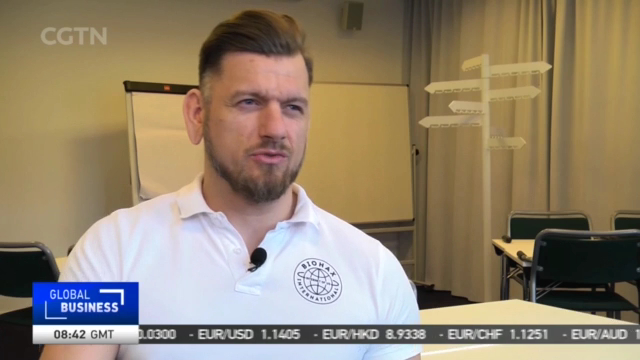
17:32, 25-Dec-2018
Trending Technology: Microchip implants making start in Europe
Updated
16:24, 28-Dec-2018
03:13

A Swedish company, Biohax International, says it has implanted microchips in about 4,000 Swedes. The implant essentially serves as an internal-employee-identification badge to grant access to buildings and to pay for things around the office, like at the cafeteria or for printing. A far smaller number of the microchips, numbering in the hundreds, are thought to have been implanted in the UK. Now, Biohax is eyeing more expansion, including possibly to the UK. But some have voiced concerns over the implants, including the UK's trade union umbrella group and also the main employers group. CGTN's Al Goodman met Biohax's owner, and reports from Stockholm, Sweden.
At the Stockholm office of the global tourism company TUI, a hundred employees, or 20 percent of the staff, are using a new technology. Microchip implants, in their hands. They get building access instead of using an ID card. Or, they can buy food at the cafeteria. Marianne Stjernvall has one, and says it's easier and she hardly thinks about it.
But this man, Jowan Österlund, thinks a lot about it. He sold the tourism company the chips. And did the implants. His small firm, Biohax International, in southern Sweden, is considered a leader on this new frontier.
JOWAN ÖSTERLUND, FOUNDER&CEO BIOHAX INTERNATIONAL "This is definitely the next step in technology. When you stop worrying about keys and cards, you behave in a new way."
He has four chips in his body. They're made in Shenzhen, China. He won't name the manufacturer. But he wants to switch production to Sweden.
AL GOODMAN CGTN "Jowan Österlund estimates about 5,000 people in Europe now have microchip implants. Most of them, right here in Sweden. And he expects a growing debate about their potential risks to the health and privacy of users. This Stockholm professor is ready for that debate, and urges caution."
SVEN OVE HANSSON, PROFESSOR ROYAL INSTITUTE OF TECHNOLOGY "We have seen quite a few cases of problems with implants where they have had negative health effects, for instance, with breast implants."
But he says the tiny glass-sealed chips have been used safely in animals.
JOWAN ÖSTERLUND, FOUNDER&CEO BIOHAX INTERNATIONAL "It's the same material that's used in transponders for cats and dogs and horses."
Privacy and chip data are another big concern, but he says there are safeguards.
JOWAN ÖSTERLUND, FOUNDER&CEO BIOHAX INTERNATIONAL "It's going to be extremely hard for anyone to control it. It's never gonna happen for any company to make it mandatory."
SVEN OVE HANSSON, PROFESSOR ROYAL INSTITUTE OF TECHNOLOGY "If there is something that you as an employee would need to carry with you, then you can carry it with you. There is no need to implant it on your body."
Sweden's national railway allows riders to show their tickets, on their microchips. Less than 50 passengers a day are doing that. Spokesmen for the railway and for the TUI tourism companies say they're trying the microchip implants, as they test a range of new technologies, including artificial intelligence.
Al Goodman, CGTN, Stockholm, Sweden.

SITEMAP
Copyright © 2018 CGTN. Beijing ICP prepared NO.16065310-3
Copyright © 2018 CGTN. Beijing ICP prepared NO.16065310-3